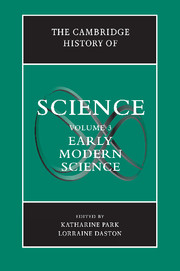Book contents
- Frontmatter
- 1 Introduction: The Age of the New
- Part I The New Nature
- Part II Personae and Sites of Natural Knowledge
- 6 The Man of Science
- 7 Women of Natural Knowledge
- 8 Markets, Piazzas, and Villages
- 9 Homes and Households
- 10 Libraries and Lecture Halls
- 11 Courts and Academies
- 12 Anatomy Theaters, Botanical Gardens, and Natural History Collections
- 13 Laboratories
- 14 Sites of Military Science and Technology
- 15 Coffeehouses and Print Shops
- 16 Networks of Travel, Correspondence, and Exchange
- Part III Dividing the Study of Nature
- Part IV Cultural Meanings of Natural Knowledge
- Index
- References
15 - Coffeehouses and Print Shops
from Part II - Personae and Sites of Natural Knowledge
Published online by Cambridge University Press: 28 March 2008
- Frontmatter
- 1 Introduction: The Age of the New
- Part I The New Nature
- Part II Personae and Sites of Natural Knowledge
- 6 The Man of Science
- 7 Women of Natural Knowledge
- 8 Markets, Piazzas, and Villages
- 9 Homes and Households
- 10 Libraries and Lecture Halls
- 11 Courts and Academies
- 12 Anatomy Theaters, Botanical Gardens, and Natural History Collections
- 13 Laboratories
- 14 Sites of Military Science and Technology
- 15 Coffeehouses and Print Shops
- 16 Networks of Travel, Correspondence, and Exchange
- Part III Dividing the Study of Nature
- Part IV Cultural Meanings of Natural Knowledge
- Index
- References
Summary
Experimental philosophy came to prominence on a wave of coffee. In the mid-1650s, a group of aspiring Oxford scholars met regularly at a new kind of place. Something like an alcohol-free tavern, it was presided over by an apothecary named Arthur Tillyard. There, spurred by liberal doses of thick, black liquid, they debated the new ideas transforming natural philosophy and the mathematical sciences. Peter Staehl, Robert Boyle’s (1627–1691) German chymist, mounted experimental displays at the same location. This club of scholars moved to London in 1660 and reemerged as what would soon be called the Royal Society. At about the same time, the novel setting in which these rendezvous had originally occurred – the coffeehouse – also moved to London and began an extraordinary surge in popularity there. Together, the coffeehouse and the Royal Society would become perhaps the two most distinctive social spaces of Restoration England. The implications of their advent would stretch beyond England itself. What began in Oxford and London would grow to affect the fortunes of the sciences throughout Western Europe.
Experiment was not the only controversial investigatory practice fostered by the rise of the coffeehouse. In 1659, political philosopher James Harrington (1611–1677) – whose Oceana (1656) had founded republicanism on a natural philosophy of circulating particles – organized regular debates at Miles’ Coffeehouse, in Westminster. Here soldiers, political figures, and ordinary citizens participated in exhilarating exchanges that ranged broadly over the history and philosophy of government. The Rota, as Harrington called this forum, both generated new knowledge and, far more importantly, exemplified a new way of proposing, debating, and resolving claims in general.
- Type
- Chapter
- Information
- The Cambridge History of Science , pp. 320 - 340Publisher: Cambridge University PressPrint publication year: 2006
References
- 3
- Cited by



